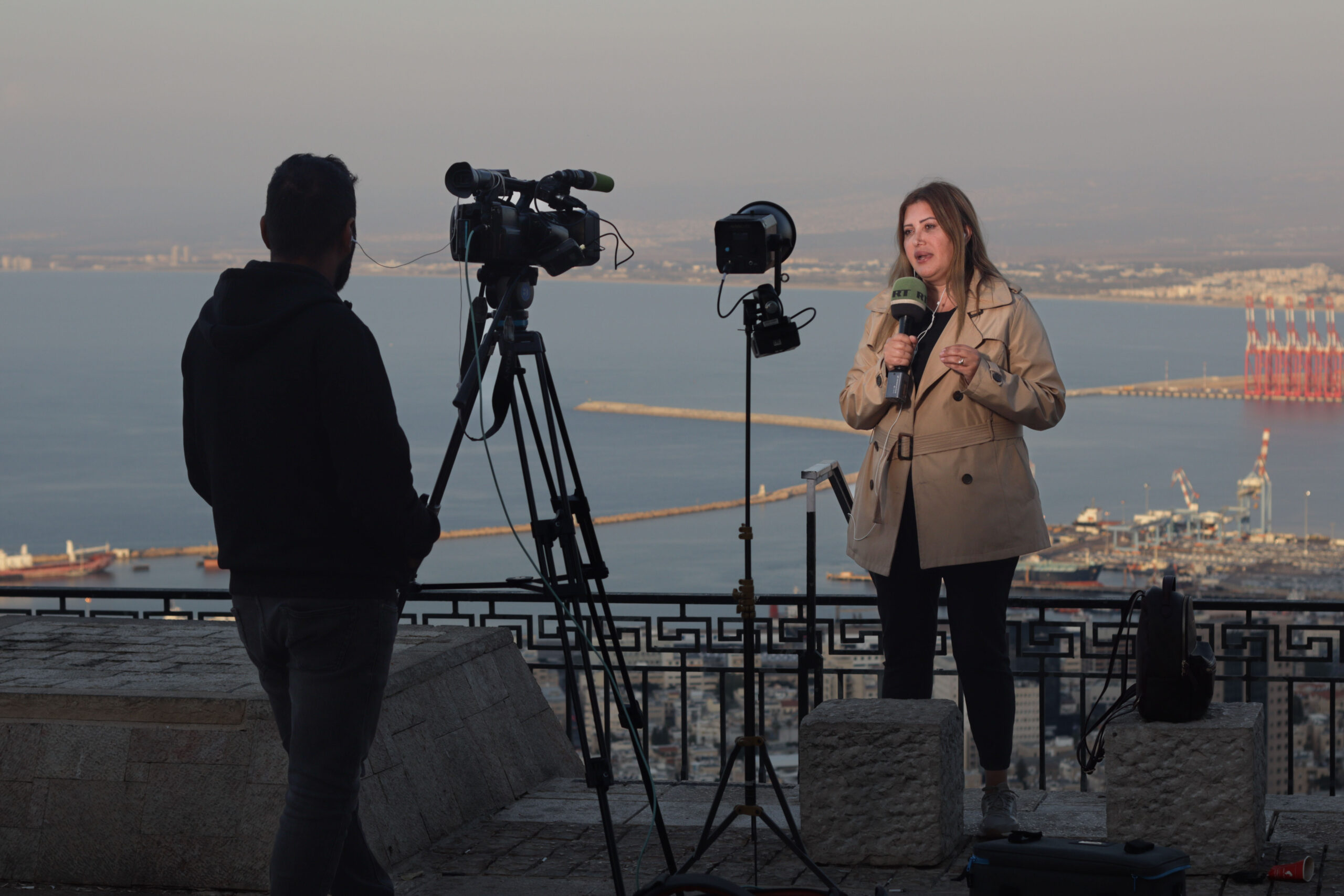RT News, or Russia Today, has long been a subject of contention within the discourse on media freedom and state propaganda. Far from being an ordinary international broadcaster, RT is emblematic of a deeper, more insidious narrative that reflects the broader ambitions of what many in the West recognize as the “Axis of Evil” — an alliance that, in modern terms, encompasses Russia, China, and Iran. The network has earned its place as a state-sponsored instrument used not only to convey a Russian perspective but to reinforce shared objectives that actively undermine democratic ideals. This explains why RT has been met with blockages and sanctions across democratic nations; the network’s operations are not merely journalistic but are instead entwined with strategies that propagate disinformation and bolster authoritarian power.

Dalia Nammari reporting from Merkaz HaKarmel, Haifa, RT Arabic
From its inception, RT News has cultivated an image as a global alternative to Western media, cleverly positioning itself as an outlet for diverse voices and “counter-narratives.” However, upon closer inspection, its reporting reveals a pattern aligned with state interests that seek to destabilize, divide, and dominate international discourse. RT’s role during pivotal moments, such as Russia’s annexation of Crimea in 2014 and the full-scale invasion of Ukraine in 2022, showcases its editorial alignment with aggressive state policies. Rather than presenting objective coverage, RT has consistently justified Russia’s military actions while omitting or distorting widely reported facts. This behavior underscores its position not as an independent news outlet, but as a cog in a state-directed machine of influence that disseminates propaganda under the guise of legitimate news.
RT’s problematic positioning becomes more acute when viewed through its role in amplifying division within democracies. The network’s editorial strategy is marked by a willingness to promote conspiracy theories and fringe perspectives that erode trust in democratic institutions. This is not a byproduct of poor journalistic standards but a deliberate tactic aimed at sowing discord. Whether stoking anti-establishment sentiments or amplifying extremist rhetoric, RT often serves as a platform that mirrors and magnifies the ideological fissures within the societies it broadcasts to. These tactics are hallmarks of information warfare, where the battleground is not defined by soldiers but by ideas, half-truths, and manipulated narratives. For nations already grappling with internal polarization, RT’s content is not just inflammatory; it is a calculated assault on democratic cohesion.
Compounding its alignment with state interests is RT’s connection to broader geopolitical strategies involving the so-called Axis of Evil. The network frequently parrots or supports narratives that are sympathetic to the goals of Russia, China, and Iran. This is particularly evident in its Middle Eastern broadcasts, where its anti-Israel bias becomes unmistakable. RT’s coverage has leaned toward promoting Iranian-backed groups such as Hamas and Hezbollah, organizations globally recognized for their role in terrorism and acts of violence. By framing these groups as legitimate resistance movements, RT helps further Iran’s regional ambitions, sanitizing their violent actions and portraying them as justified responses to Israeli or Western policies. This endorsement of extremist proxies is not an anomaly but a feature of RT’s editorial stance, solidifying its reputation as a vehicle for propaganda that aligns with the foreign policy goals of authoritarian states.
The Middle East is not the only arena where RT operates as an extension of this broader axis of influence. Its relationship with China reflects a mutual understanding where each state-backed media supports the other’s narratives, particularly those that undermine Western hegemony. Whether it is amplifying China’s stance on Taiwan or defending its policies in the South China Sea, RT’s coverage often mirrors the positions taken by its geopolitical allies. These alignments illustrate a shared goal: to reshape the global order in favor of autocratic governance and to diminish the influence of liberal democracies.
It is no surprise, then, that democratic nations have taken significant steps to limit or ban RT’s operations. The rationale behind these actions is not merely punitive; it is protective. Democracies understand that while freedom of speech is a core value, it does not extend to platforms that actively work to destabilize societies through manipulated information. Blocking or sanctioning RT is seen not as an act of censorship, but as a necessary measure to defend the integrity of public discourse. When the European Union banned RT following the invasion of Ukraine, it was viewed as an essential move to prevent a state-backed disinformation campaign from further exacerbating tensions and undermining democratic unity. This decision underscored a crucial point: while democracies are champions of press freedom, that freedom has limits when it comes to safeguarding against deliberate and destructive misinformation.
RT News, therefore, represents more than just a broadcaster with a different editorial focus. It is a tool wielded by an alliance of authoritarian powers—Russia, China, and Iran—each with vested interests in seeing the erosion of democratic systems and values. Through targeted programming and strategic alliances, RT’s content serves as a potent mix of state-aligned messaging, disinformation, and subversion. Its support for terrorist proxies like Hamas and Hezbollah, its anti-Israel rhetoric, and its partnership with authoritarian narratives make it a critical player in the global information war.
To view RT solely as an international news outlet is to miss the broader strategy it embodies. It is an ideological weapon in a new kind of warfare, where narratives are the ammunition and global stability is the target. For democracies seeking to maintain the integrity of their public discourse and protect against the threats posed by this axis of influence, the decision to block or sanction RT is not just justified—it is imperative.
Leave a Reply